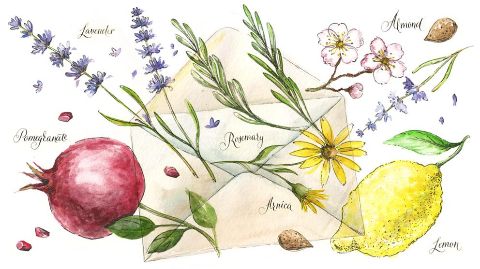Your basket is empty!
Click on this link to start shopping!
QUALITY & INGREDIENTS
Why Choose Weleda Skin Care?
Since 1921, Weleda has pioneered the use of wild-crafted (from wild plants), organic and biodynamic farming principles in our NATRUE-certified natural skin care products whenever possible to promote harmony and health. We believe the closer we are to nature, the more our bodies work in harmony. Our finest ingredients are cultivated by the loving hands of dedicated farmers in both New Zealand and throughout the world. We create all-natural medicines and premier, nourishing skin care that captures the power and potency of nature. When you care for your skin with our plant-based preparations, you experience a vitality that only nature can bring.
How does Weleda preserve its products?
All of our skin care products are certified natural by NATRUE and are preserved using a touch of grain alcohol, essential oils and nourishing plant extracts to maintain the life of our products. Our unique and recyclable packaging protects each formulation from light and air, helping to prevent oxidation. With our effective preservation techniques, our products needn’t be refrigerated. However, their freshness information is on packaging.
How do you colour and fragrance your skin care products?
Our products are the colour of the essential plant extracts that are used in the formula. All formulas are fragranced with those same essential oils and plant extracts. We do not use any synthetic colours or fragrances.
Do you use any synthetic ingredients?
We use only nourishing essential oils and plant extracts. All Weleda skin care products are certified natural by NATRUE, FREE of synthetic preservatives, fragrances, colourants and raw materials derived from mineral oils, as well as genetically modified organisms (GMO's). Our products are instead FULL of the highest quality plant extracts for your body.
What is biodynamic agriculture and why do you employ this cultivation method?
Recognised as a holistic, ecological, and ethical farming system, biodynamic agriculture includes gardening, food and nutrition, as well. The teachings of biodynamically-centered agriculture have been practiced worldwide for nearly a century. The basic idea is that the farm itself is a living organism—a self-sustaining system that creates and sustains life, and supports and heals itself. If it sounds like the principles Dr. Rudolf Steiner applied to how the skin functions, it is because it is the same concept of self-healing and growth. At Weleda, we view the earth as an interconnected living organism. Plants, animals and human beings have an inherent and beautiful relationship with one another and their surroundings.
What is the INCI?
The International Nomenclature for Cosmetic Ingredients (INCI) is the system we use for labelling our ingredients. This labelling standard denotes all ingredients according to their Latin (Chemical / Scientific) designation as specified by the regulatory board. All ingredients are listed by their quantity of presence—greatest to least—in the product. Due to its full ingredient disclosure policy, the INCI standards strive to help you, the consumer, make informed and healthy purchases, helping you avoid any ingredients to which you may be allergic.
Why do some of your skin care and medicine products contain alcohol?
In homoeopathic medicines and tinctures, alcohol is traditionally used to draw out the vital life forces of a plant to create a botanical extract in a specific concentration. Alcohol is also used as a natural preservative in our formulations. We use organic grain alcohol, which is naturally derived from fermented plant sugars. We do not use Methyl or Propyl alcohol—also known as rubbing alcohol.
Why do you use seed and nut oils in your products?
Plants oils, derived from seeds, nuts and fruits, gently care for and nourish your skin. Unlike petroleum-based mineral oils, plant oils are believed to help support and make your skin feel balanced.
What is glycerin and why do you use it?
Glycerin is a threefold-alcohol found in every fat. We use glycerin derived from the coconut or palm kernel oil. This ingredient is produced through the saponification process of plant oil and soap. It regulates the absorption and release of water, leaving skin feeling softer and smoother.
What is lanolin and why do you use it?
Lanolin is a wax derived from the wool of sheep. The process of extracting this wool does not harm the sheep in any way, as the shearing of wool is a necessary process. It is cleaned to remove any possible pesticide residue. This beneficial ingredient contains fats that give it an affinity to the skin, making it an ideal moisturiser. We use lanolin to nourish and moisturise the skin.
Do you test your skin care products on animals?
Weleda does not do any animal testing in the manufacture, development or quality control of its natural cosmetics, nor does it commission such testing. The company is fundamentally opposed to the use of animal testing. Weleda’s skin care products are certified natural by the European organisation NATRUE, which requires and enforces that no cosmetics be tested on animals. However, product safety is paramount. Weleda uses raw materials that have been used for many years, so their tolerability is well documented. Before introducing new products to the market, Weleda carries out extensive in-use studies on volunteer subjects. The formulas are subject to toxicological testing to ensure their safety, tolerability and efficacy.
Do you use allergy-tolerated wheat starch or gluten in your products?
Gluten, the protein found in wheat and other grains, poses as an allergy concern for some people. As a natural component of wheat, it is found in some of the ingredients we use in our products. Many of our skin care products include small quantities of organic alcohol derived from organic wheat. A few products are also formulated with Triticum Vulgare (Wheat Germ) Oil. We cannot guarantee that these ingredients are entirely free of all traces of gluten.
Many of our tablets contain wheat starch in a presence of up to 25 mg per tablet. In regards to associated allergy-concerns for those suffering from Celiac Disease, according to the German Celiac Disease Society, after washing out the albumen fraction from the wheat flour, the resulting pure wheat starch—containing less than .05% residual nitrogen (the so-called primary wheat starch)—may be declared as being gluten-free.
At this time, we cannot guarantee that our raw materials do not come in contact with gluten-containing ingredients. If you have a gluten sensitivity or allergy, we recommend you consult with your medical practitioner before using any of our products containing these ingredients.

